5 Big AI Announcements You Need to Know from WordCamp US 2025
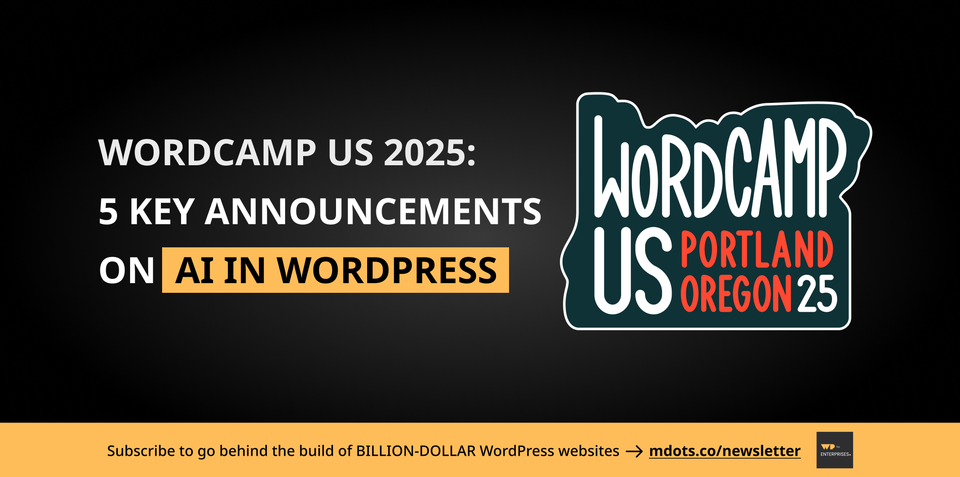
Last year, just four of us from Multidots attended WordCamp US.
This year, the event was smaller — but our presence was bigger.
Eight of us from India, Canada, and the US came together in Portland.
The reason? Our quarterly “Strategy Camp.” It’s our in-person ritual to align on big ideas, solve tough problems, and do hands-on team-building.
What stood out this time was how the WordPress community is thinking about AI.
There’s a shift happening — not just adding random AI plugins, but building real infrastructure and tools that help enterprises scale with AI.
Here’s a quick recap of what was announced, and why it matters if you run WordPress at scale.
1: TELEX: AI-GENERATED GUTENBERG BLOCKS
What if building a WordPress block was as simple as typing an idea? That’s what Telex makes possible.
In his keynote, Matt Mullenweg announced the experimental tool that generates custom Gutenberg blocks from natural language prompts.
You type what you want, and it generates a working Gutenberg block. Still early, but it could transform prototyping and speed up custom block development.
Why it matters:
- Turn ideas into working blocks in minutes.
- Teams without deep technical expertise can still innovate.
- Custom workflows and blocks that once took weeks could now be tested in a single afternoon.
2: PHP AI CLIENT SDK: ONE GATEWAY TO ALL MODELS
One of the biggest announcements at WCUS 2025 was the PHP AI Client SDK. This toolkit gives WordPress a shared infrastructure for connecting to AI providers — whether it’s OpenAI, Anthropic, Google, or others — all through one clean interface.
For users, this means you only enter your AI provider credentials once, and every compatible plugin just works. No more juggling API keys across multiple places.
For developers, it removes the need to rebuild the same integrations again and again. They can focus on creating powerful AI features, while the SDK handles the heavy lifting in the background.
For enterprises, it ensures flexibility. You’re not locked into a single AI vendor, and you can switch providers as your needs, costs, or compliance requirements change.
Example (provider-specific):

Example (provider-agnostic):

In simple terms, the SDK solves the messy problem of every plugin managing AI differently.
If you wish to, learn more here.
James LePage, Automattic
"Our entire goal here is to enable people on WordPress to use and implement AI effectively."
3: ABILITIES API
Every WordPress site runs dozens of plugins (backups, SEO, ecommerce, analytics), but until now, there’s been no standard way for these plugins to describe what they can do. The Abilities API changes that.
For developers, it’s a shared language where plugins can register their capabilities in a structured way (for example: “analyze SEO,” “create a backup,” or “generate a sales report”).
For AI systems, it creates a clear “menu” of what WordPress can do, making it possible for assistants like ChatGPT or Claude to safely trigger real actions inside WordPress.
For enterprises, it’s a foundation for automation. Instead of siloed plugins, you get a connected ecosystem where features can be discovered, composed, and coordinated across your entire site.
The Abilities API is planned for WordPress 6.9 (December 2025) and will also power things like the new Command Palette and workflow tools.
Combined with the MCP Adapter, it becomes the bridge between WordPress and AI assistants.
4: MCP ADAPTER
Picture this: your editor says, “Publish our WCUS recap for tomorrow.”
An AI assistant drafts the post, pulls approved images, runs your SEO check, schedules it, and pings you for final approval — all by calling WordPress abilities you’ve already exposed.
That’s MCP + Abilities API working together.
The MCP Adapter connects WordPress to the Model Context Protocol, the upcoming industry standard for how AI agents talk to apps safely and consistently.
What it means for enterprises
- Real workflows, end-to-end: Assistants can create posts, manage media, update products, or run reports — not just chat.
- Standards, not one-offs: WordPress can expose its capabilities (as an MCP server) and connect to other MCP tools (as a client) over time.
- Governed and secure: Actions respect WordPress roles/capabilities and can require approvals.
5: AI EXPERIMENTS PLUGIN
AI will become integral to how people interact with WordPress. We now have a new canonical plugin (GitHub) where WordPress tests new AI ideas before they become part of core.
Think of it as a sandbox for the future. You can already try features like:
- Generating better headlines and excerpts.
- Cleaning up layouts with a single click.
- Exploring how different AI providers handle content tasks.
For enterprises, it’s the on-ramp to AI in WordPress. It helps the community decide which tools are ready for prime time.
More about AI Experiments Plugin.
BOTTOM LINE FOR ENTERPRISES
For enterprises, the takeaway is simple: AI is becoming part of WordPress itself.
- Scalable workflows with the Abilities API + MCP Adapter
- Freedom from lock-in through the PHP AI SDK
- A safe testing ground with the AI Experiments plugin
- Faster prototyping using Telex to generate Gutenberg blocks
Start experimenting now with future-ready, flexible AI integrations directly inside WordPress.
AI is moving fast, but WordPress is moving with it — and in many ways, leading.
If you’re curious, I also put together a guide on how big enterprises are already using AI in WordPress.
Our few days in Portland on our strategy camp gave us space to align as a team, and WCUS gave us the inspiration of a global community moving WordPress forward.
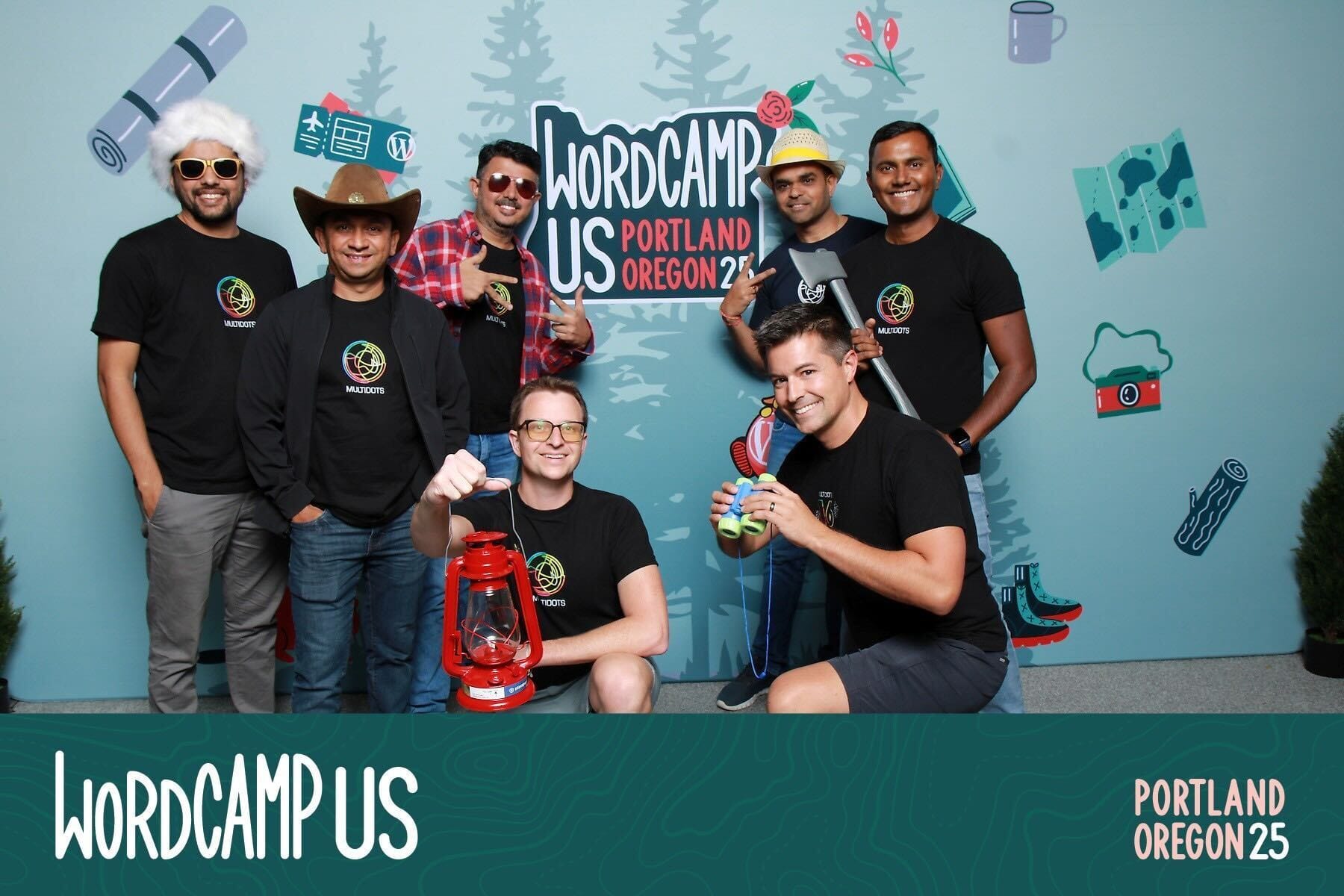
IN CASE YOU MISSED IT
By the way, in the previous issue, I shared "How a €20B Tech Giant Rebuilt Their Digital Foundation & Accelerated Publishing".
In this issue, you'll discover:
- Why Capgemini abandoned Drupal after years of frustration.
- How WordPress unleashed a "digital culture of creation" across 40 countries.
- 5 strategies that transformed their content operations in just months.
- Inside Capgemini's enterprise-grade WordPress architecture.
- Key lessons CTOs and digital leaders can apply immediately.
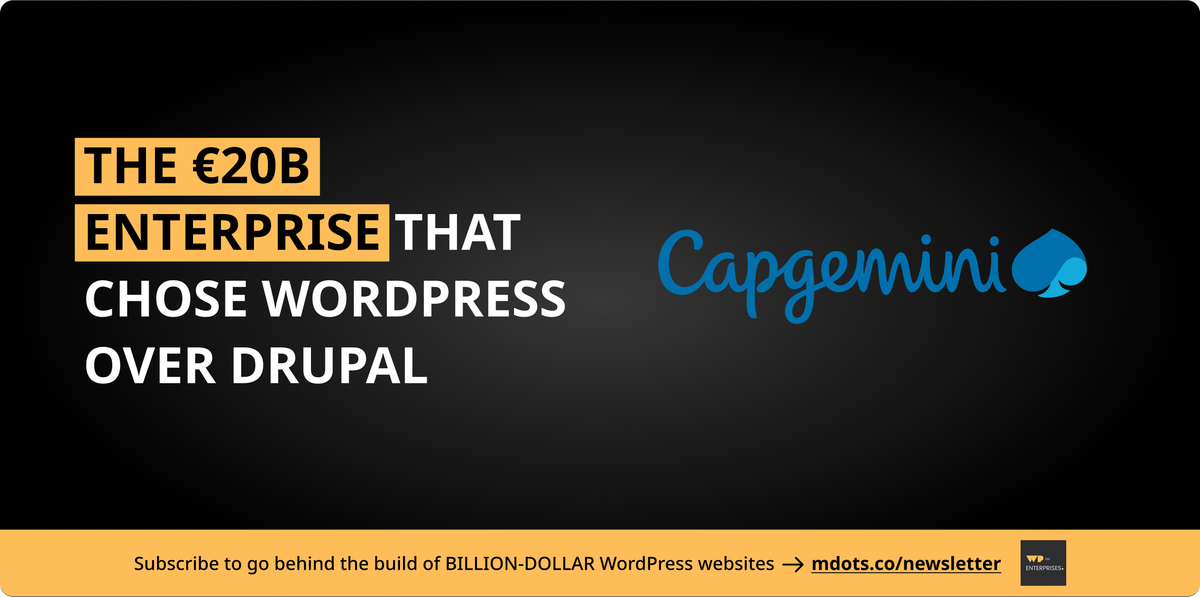
👋 Until next time, Anil | CEO and Co-Founder → Multidots, Multicollab & Dotstore.
P.S. I also write about personal growth and agency growth.

WP for ENTERPRISES is brought to you by Multidots, an enterprise WordPress web agency that’s been empowering big enterprises to scale and succeed with WordPress.

Whenever you're ready (no pressure), there are four ways we can help:
#1: Enterprise WordPress consulting – Think of us as your WordPress GPS. We’ll get you where you need to go.
#2: Migrate your website to WordPress – No stress, no mess—just a smooth ride to the WP world.
#3: Designing and building a new site – Your dream site, minus the nightmares.
#4: Optimizing and maintaining your site – Because nobody likes a slow website (or a hangry one).
📆 Book a quick, free call—no hassle, no commitment, just solutions that work for you.
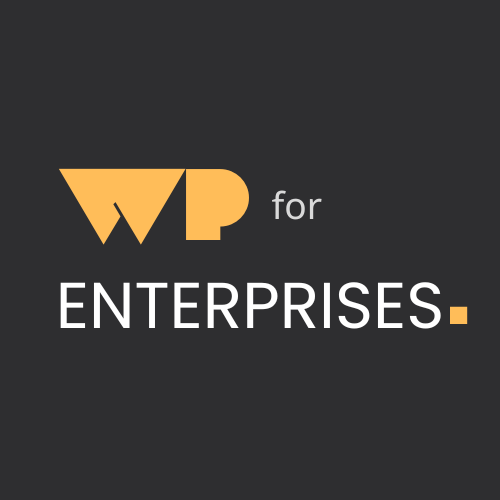
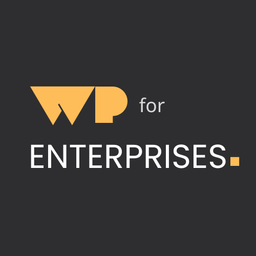
Member discussion